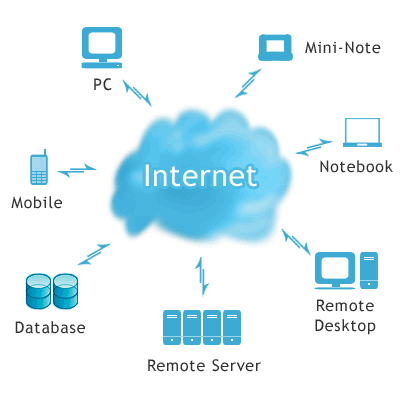On cloud nine: Time to ignore cloud computing critics’ irrational concerns
Everyone needs to realize that the risk of cloud computing is really no risk at all
BY BEN STRACK
Close your eyes and imagine this scenario: You’re making your way home after an unusually long day at work when your Smartphone suddenly vibrates. It’s your boss, and he needs a report sent out immediately. Since only minor changes need to be made, it would be a shame to have to turn around and drive all the way back to the office. But you’re hooked up to a cloud service, which means you can use your phone (at red lights or on the side of the road, of course) to go on the Internet, edit the documents on Google Docs, and send them back to your badger-of-a-boss using Gmail.
And it’s all done in less than five minutes time thanks to cloud computing.

What is cloud computing?
Cloud computing is a vague phrase covering any type of computing or storage service that is delivered to its users by remote servers. One of the simplest examples is online email, though cloud computing actually goes way beyond that: it allows users to store music, photos, applications, documents, reminders, notes, eBooks, and contacts.
Because you are storing all your information on the Internet, cloud computing allows you to access and edit the content anytime, anywhere, from all Web-capable devices. Conveniently, if you change a contact, for example, on one device, all other devices you own will be updated. The cloud also enables you to effortlessly share files with other people.
Some of the most popular cloud computing services includes Google Drive , Apple’s iCloud , Microsoft’s Skydrive , and Dropbox . These services provide users anywhere from 2 to 5 Gbytes for free, and charge only for additional gigabytess used.
By simply setting up one’s log-in information and transferring a few files, moving to the cloud is as pleasant and easy as laying on one.
Concerns users have about cloud computing
Opponents of cloud computing label questionable security as one of their main concerns with the new technology. The argument is that once your data is in somebody else’s hands, all hell can break loose. I suppose it can, but with that mindset, I suppose you could also drive thousands of miles to avoid a plane crash. Even with as many hackers on the Web as there are nowadays, most servers encrypt their data, and give users the choice to share files or keep them private.
In addition, there are service-specific features that enhance security protection. For instance, iCloud offers users the option to remotely wipe or lock an iPhone or iPad in the case of an emergency. If your iPod is stolen, you can delete personal data, or simply lock down the device while you track it. This service helps users feel a little bit better about safeguarding their data when the unexpected occurs.
Outages are another concern when it comes to using the cloud. If your personal or business Internet service is down, all your information is unreachable. Downed Internet service is a rarity, though. Someone making this argument could also say that if you were to get struck by lightning, the destination you were proceeding to is also unreachable. For cloud users, much like being assaulted by one billion volts of electrostatic discharge, outages are infrequent, and do not last long when they do occur.
Final words
If you think the risks of cloud computing outweigh the rewards, you are kidding yourself. Keep in mind that taking caution and being stubborn are two very different actions. If change scares you that much, don’t be upset when your hard drive crashes and you lose everything. As rare as that is, it could happen, as could getting hacked, or having an outage at an inopportune time.
In addition to your hard drive crashing, fire drives, cables, and CD files can get damaged or lost in the sea of hardware that you may have in your home or place of work. Some users say that storing files on the cloud works well as a backup in such cases, but perhaps backing up the cloud with hardware is the best option. Only then can the modern world continue to evolve, allowing cloud computing technology to improve our lives.
Yes, of course taking caution is important, and learning as much as you can about the cloud will help you see the many benefits of the service. By using security measures such as setting strong passwords, making important files private, and using the remote wipe/lock service, you will maximize the safety of your data and enjoy living “on cloud nine.” ■
Advertisement
Learn more about Electronic Products Magazine





